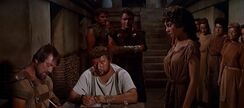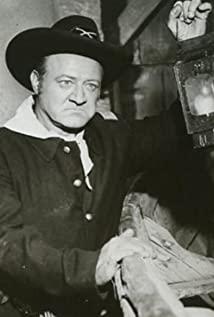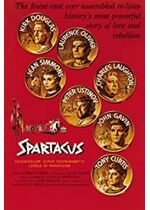-
Spartacus: And maybe there's no peace in this world, for us or for anyone else, I don't know. But I do know that, as long as we live, we must remain true to ourselves.
-
Batiatus: A good body with a dull brain is as cheap as life itself.
-
Gracchus: This republic of ours is something like a rich widow. Most Romans love her as their mother, but Crassus dreams of marrying the old girl, to put it politely.
-
Spartacus: What's your name?
Draba: You don't want to know my name. I don't want to know your name.
Spartacus: Just a friendly question.
Draba: Gladiators don't make friends. If we're ever matched in the arena together, I have to kill you.
-
Gracchus: You and I have a tendency towards corpulence. Corpulence makes a man reasonable, pleasant and phlegmatic. Have you noticed the nastiest of tyrants are invariably thin?
-
Batiatus: Come with us. See to it I don't misuse the money.
Gracchus: Don't be ridiculous. I'm a Senator.
-
Antoninus: Are you afraid to die, Spartacus?
Spartacus: No more than I was to be born.
-
Batiatus: Good luck, and may fortune smile upon... most of you.
-
Julius Caesar: Rome is the mob.
Marcus Licinius Crassus: No! Rome is an eternal thought in the mind of God.
Julius Caesar: I'd no idea you'd grown religious.
Marcus Licinius Crassus: [laughs] It doesn't matter. If there were no gods at all I'd still revere them. If there were no Rome, I'd dream of her.
-
Marcus Licinius Crassus: The enemies of the state are known, arrests are being made, the prisons begin to fill.
-
Varinia: Please die, my love... die, die now, my darling!
-
Marcus Licinius Crassus: One of the disadvantages of being a Patrician is that occasionally you are obliged to act like one.
-
Spartacus: I am not an animal!
Varinia: Neither am I.
-
Marcus Licinius Crassus: Do you eat oysters?
Antoninus: When I have them, master.
Marcus Licinius Crassus: Do you eat snails?
Antoninus: No, master.
Marcus Licinius Crassus: Do you consider the eating of oysters to be moral and the eating of snails to be immoral?
Antoninus: No, master.
Marcus Licinius Crassus: Of course not. It is all a matter of taste, isn't it?
Antoninus: Yes, master.
Marcus Licinius Crassus: And taste is not the same as appetite, and therefore not a question of morals.
Antoninus: It could be argued so, master.
Marcus Licinius Crassus: My robe, Antoninus. My taste includes both snails and oysters.
-
Lentulus Biatatus: There's one man I hate: Crassus.
Sempronius Gracchus: You've grown very ambitious in your hatred.
-
Marcus Publius Glabrus: How were you able to get my appointment without Gracchus knowing?
Marcus Licinius Crassus: I fought fire with oil. I purchased the Senate behind his back.
-
Lentulus Batiatus: But I'm a civilian. I'm more of a civilian than most civilians.
-
Caius: Sir, allow us to pledge you the most glorious triumph of your career.
Marcus Licinius Crassus: I'm not after glory, I'm after Spartacus!
-
Antoninus: I'm Spartacus!
[everyone around Antoninus and Spartacus takes up the shout]
-
Marcus Licinius Crassus: I understand - I'm informed that Spartacus once trained under your auspices.
Lentulus Biatatus: Yes. In fact, if it isn't too subversive to say so, I made him what he is today.
-
Marcus Licinius Crassus: You can't grieve forever.
Varinia: I'm not grieving.
Marcus Licinius Crassus: What are you doing?
Varinia: I am remembering.
Marcus Licinius Crassus: And what do you remember when you think of Spartacus?
Varinia: I remember that he started out all alone. And yet, on the day he died, thousands and thousands died in his place.
-
[Crassus, as the new Consul, addresses the legions and the Senate]
Marcus Licinius Crassus: I promise you a new Rome. A new Italy, and a new Empire.
[pause]
Marcus Licinius Crassus: This, I have sworn by the spirits of my ancestors. This I have sworn, in the temple that guards their bones.
-
Marcus Licinius Crassus: In every city and province, lists of the disloyal have been compiled. Tomorrow they will learn the cost of their terrible folly... their treason.
Gracchus: And where does my name appear on the list of disloyal enemies of the state?
Marcus Licinius Crassus: First.
-
[first lines]
Narrator: In the last century before the birth of the new faith called Christianity, which was destined to overthrow the pagan tyranny of Rome and bring about a new society, the Roman Republic stood at the very center of the civilized world. "Of all things fairest," sang the poet, "first among cities and home of the gods is golden Rome." Yet, even at the zenith of her pride and power, the Republic lay fatally stricken with a disease called human slavery. The age of the dictator was at hand, waiting in the shadows for the event to bring it forth. In that same century, in the conquered Greek province of Thrace, an illiterate slave woman added to her master's wealth by giving birth to a son whom she named Spartacus. A proud, rebellious son who was sold to living death in the mines of Libya before his thirteenth birthday. There, under whip and chain and sun, he lived out his youth and his young manhood dreaming the death of slavery two thousand years before it finally would die.
-
[last lines]
Varinia: Goodbye, my love, my life. Goodbye, goodbye.
-
[Spartacus is reluctant to make love to Varinia due to her pregnancy]
Varinia: I won't break.
-
Tigranes Levantus: If you looked into a magic crystal, you saw your army destroyed and yourself dead. If you saw that in the future, as I'm sure you're seeing it now, would you continue to fight?
Spartacus: Yes.
Tigranes Levantus: Knowing that you must lose?
Spartacus: Knowing we can. All men lose when they die and all men die. But a slave and a free man lose different things.
Tigranes Levantus: They both lose life.
Spartacus: When a free man dies, he loses the pleasure of life. A slave loses his pain. Death is the only freedom a slave knows. That's why he's not afraid of it. That's why we'll win.
-
Batiatus: But, my dear, great, all-conquering Marcus Licinius Crassus... what if it is Spartacus who crosses the battlefield, looking for you?
Marcus Licinius Crassus: In such circumstances, I have no doubt you will be helping him.
-
[on a gladiator who had wanted to see Rome]
Spartacus: He has no need. Rome has come to us.
-
Lentulus Biatatus: [reacting to a slow servant] The sun's over there! I have to pay these people!
-
Marcus Licinius Crassus: Did you truly believe 500 years of Rome could so easily be delivered to the clutches of a mob? Already the bodies of 6000 crucified slaves line along the Appian Way. Tomorrow the last of their companions will fight to their death in the temple of my fathers as a sacrifice to them. As those slaves have died, so will your rabble... if they falter one instant in loyalty to the new order of affairs. Arrests are in progress. The prisons began to fill. In every city and province, lists of the disloyal have been compiled. Tomorrow, they will learn the cost of their terrible folly... their treason.
Gracchus: Where does my name appear on the list of the disloyal enemies of the state?
Marcus Licinius Crassus: First. Yet, I have no desire of vengeance upon you. Your property shall not be touched. You will retain the rank and title of a Roman Senator. A house... a farmhouse in Picenum has been provided for your exile. You may take your women with you.
Gracchus: Why am I to be left so conspicuously alive?
Marcus Licinius Crassus: Your followers are deluded enough to trust you. I intend that you shall speak to them tomorrow for their own good, their peaceful and profitable future. From time to time thereafter, I may find it useful to bring you back to Rome to continue your duty to her, to calm the envious spirit and the troubled mind. You will persuade them to accept destiny and order and trust the gods!
-
Batiatus: There I was, better than a millionaire in the morning and a penniless refugee by nightfall with nothing but these rags and my poor flesh to call of my own. All because of Crassus decides to break his journey at Capua with a couple of capricious, over-painted nymphs! These two daughters of Venus had to taunt the gladiators, force them to fight to the death and before I knew what had happened, *revolution* on my hands!
Gracchus: What revenge have you in mind?
Batiatus: I sold Crassus this woman, Varinia. May the gods give her wens. There was no contract, but she was clearly his slave as soon as the deal was made. Now she's off with Spartacus killing people in their beds. And Crassus, no mention of the money, no!
Gracchus: You never offered me this woman. Why not?
Batiatus: Well, she's not remotely your type, Gracchus. She is very thin and...
Gracchus: Look around you. You'll see women of all sizes. 500 sesterces deposit on Varinia. Since he hasn't paid, this gives me first call over Crassus.
Batiatus: May the Gods adore you! Why would you buy a woman that you have never seen?
Gracchus: To annoy Crassus, of course, and to help you.
-
Ramon: We have visitors. Tremendous visitors! Two simply enormous Roman lords on the hill.
Batiatus: How easily impressed you are, Ramon. Just 'cause they're Romans, I suppose they're enormous. Tell them to wait for me when they arrive.
Ramon: Master, you don't understand!
Batiatus: How enormous do these Roman lords get?
Ramon: One of them is Marcus Licinius Crassus.
Batiatus: What? Wait a minute. Crassus here? Varinia, my red toga with the acorns. And some chairs in the atrium. Second-best wine. No, the best, but small goblets.
[Notices a head-bust]
Batiatus: Gracchus! You know how Crassus loathes him. Take him away.
Ramon: I can't lift it.
Batiatus: Use your imagination! Cover him. Tell Marcellus to get the men ready. Crassus has expensive taste. He'll want a show of some sort.
[to the head-bust]
Batiatus: Forgive me, Gracchus.
-
Batiatus: Marcus Licinius Crassus. Most noble radiance, first general of the Republic, father and defender of Rome, honour my house. Bless it with your presence. Wine! Sweetmeats! Can't you see that Their Honours are exhausted? Have the goodness to sit. Is anything wrong, Your Nobility?
Marcus Licinius Crassus: No.
Batiatus: Welcome to the Lady Claudia Maria, former wife of Lucius Caius Marius, whose recent execution touched us all so deeply. Honour to the Lady Helena, daughter of the late Septimus Optimus Glabrus, whose fame shall live on forever in the person of his son, your brother, Marcus Publius Glabrus, hero of the Eastern Wars.
Helena Glabrus: How very much he knows. Allow me to bring you up to date. We're here to celebrate the marriage of my brother to the Lady Claudia.
Batiatus: A mating of eagles, Your Sanctity! Fan His Magnitude. He sweats.
-
Gracchus: [after offering Batiatus 500,000 sesterces to kidnap Varinia from Crassus and Batiatus is still cowering] Let's add courage to your new found virtues. Make it 1,000,000 sesterces.
Batiatus: Crassus does seem to dwindle in the mind.
-
Helena Glabrus: [after she has selected the best gladiators to fight to the death] Do my choices displease you?
Batiatus: Oh no, Lady Helena. I tingle.
-
Varinia: You like him, don't you.
Spartacus: Who wants to fight? An animal can learn to fight. But to say beautiful things, and to make people believe them...
-
Julius Caesar: [about Spartacus] Did you fear him, Crassus?
Marcus Licinius Crassus: Not when I fought him, I knew he could be beaten. But now I fear him, even more than I fear you.
Julius Caesar: Me?
Marcus Licinius Crassus: Yes, my dear Caesar, you.
-
[deleted scene]
[last words]
Gracchus: [to his maid Julia] The new master of Rome will be calling on me tomorrow, he wants me to make a speech. Take him to wherever I am and show me to him. And Julia, when I meet you in paradise, describe to me the expression on his face when he saw me dead. Now go away. Go away!
-
Marcus Licinius Crassus: [about Antoninus and Spartacus] Let them fight now. Unchain them.
Julius Caesar: The entire city's been told, they'll fight tomorrow in the temple of your ancestors.
Marcus Licinius Crassus: They will fight now, for me! Here! And to the death! And the victor will be crucified!
-
[being forced to fight]
Spartacus: Don't give them the pleasure of a contest. Lower your guard, I'll kill you on the first rush.
Antoninus: I won't let them crucify you!
Spartacus: It's my last order, obey it!
-
[fighting]
Spartacus: Do you realize how long it takes to die on a cross?
Antoninus: I don't care!
-
Spartacus: [to Crassus, about the slain Antoninus] Here's your victory. He'll come back. He'll come back, and he'll be millions!
-
Gracchus: Julia, I don't like the sound of weeping. This is a happy house, please stop.
-
Gracchus: Will you please leave, before the soldiers get here?
[an overcome Varinia embraces Gracchus]
Gracchus: Oh... oh, this would make Crassus really jealous. Go now, and make my joy complete. Save your tears now, save them for the journey.
-
[last words]
[looking at two daggers, picks one]
Gracchus: Prettier...
-
Marcus Licinius Crassus: Great merciful bloodstained gods! Your pardon.
-
Varinia: You're afraid of him, aren't you? It's no use trying to be better than him, it won't work.
Marcus Licinius Crassus: We shall see...
-
Julius Caesar: I thought you had reservations about the gods.
Gracchus: Privately I believe in none of them - neither do you. Publicly, I believe in them all.
-
Julius Caesar: Is it me you want or is it the garrison?
Marcus Licinius Crassus: [laughs softly] Both.
-
Marcus Licinius Crassus: Are you not aware of Rome's most ancient law? That no General may enter the city at the head of his armed legions?
Marcus Publius Glabrus: Sulla did.
Marcus Licinius Crassus: Sulla? To the infamy of his name! To the utter damnation of his line.
-
Marcellus: No talking in the kitchen, slave.
-
Varinia: What are you thinking about?
Spartacus: I'm free. And what do I know? I don't even know how to read.
Varinia: You know things that can't be taught.
Spartacus: I know nothing. Nothing. And I wanna know. I want to... I wanna know.
Varinia: Know what?
Spartacus: Everything! Why a star falls and a bird doesn't, where the sun goes at night, why the moon changes shape. I wanna know where the wind comes from.
Varinia: The wind begins in a cave: far to the north, a young god sleeps in that cave. He dreams of a girl and he sighs, and the night wind stirs with his breath.
[laughs]
Spartacus: I wanna know all about you. Every line, every curve. I wanna know every part of you. Every beat of your heart.
-
Gracchus: Don't you be so stiff-necked about it. Politics is a practical profession. If a criminal has what you want, you do business with him.
-
Spartacus: I'd rather be here, a free man among brothers, facing a long march and a hard fight, than to be the richest citizen of Rome, fat with food he didn't work for, and surrounded by slaves.
-
Batiatus: Anyone who believes I'll turn informer for nothing is a fool. I bore the whip without complaint.
Gracchus: Indeed, that sounds like a bad attack of dignity.
-
Gracchus: Dignity and honesty in one afternoon. I hardly recognize you.
Spartacus Quotes
-
Maia 2021-11-13 08:01:24
79/100 If this movie is completely controlled by Kubrick, it should probably also be a god. The idealization of Spartacus's setting may be because he does not need a realistic description. On the surface, the world is all Spartacus tossing, but behind it is the story of Crassus.
-
Chadrick 2022-04-22 07:01:08
The works that Lao Ku himself does not approve of, in the film itself, are realistic and tragic epics, quite imitating the shadow of the "Ben-Hur" of the previous year. The two narrative lines of Spartacus and the politicians who play tricks are interspersed with each other, which is not messy, and the plot is still compact; the disadvantage is that the human nature is not portrayed deeply enough, and it is too Hollywood; the love in the film is always warm and silent, symbolizing hope The bloody road to freedom where babies were crucified on both sides of slave crosses.











